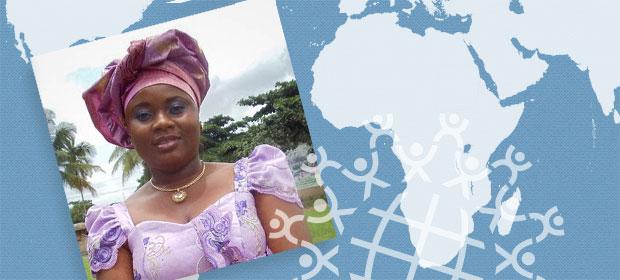Where We Work
See our interactive map


This is an excerpt of a post that originally appeared on the iHRIS Blog.Oluchukwu Ifele is a nurse by training, with a focus on nursing education and midwifery. She’s part of the Nursing and Midwifery Council of Nigeria, a regulatory body for nurses and midwives that promotes excellence in nursing education, research, administration, and practice. She supervises the clerical staff members who use IntraHealth International’s open source iHRIS software to capture, process, and store licensure data for Nigerian-trained nurses and midwives.
Q: Why did you become a nurse?
A: One of my mom’s sisters is a nurse. While I was growing up, anytime we were sick, my mom would take us to her, and she took care of us. My mom is a very strict person, but my auntie is so kind and caring. I remember thinking that I wanted to be like her, to have her serenity and her caring nature. I think that’s what originally made me want to go into nursing.
Why do you think she was a role model for you?
There are two kinds of people in the nursing profession—people who do not do their work well and people who try as much as possible to do their work very well. She’s among those people who tried to be very meticulous and do her job, I think, absolutely well.
When we were growing up, in the hospitals the nurses would bark at you. They did things forcefully. If you cried, they would tell you to be quiet, as if it’s not natural for a child to be scared. My auntie was not like that. She was so different from what we used to see in the hospital. So that’s part of what influenced me and I wanted to really be like her.
What was it like in your office when you began work as an administrator? Your organization wasn’t using iHRIS yet, right?
There were very big registers. They were large books that contained the information of registered nurses and midwives. We were the custodians of those registers. We accessed the records manually, going through the registers and looking for the registration numbers.
Were you using a paper system exclusively, or were you also using spreadsheets on a computer system?
We just used paper. And these registers really are quite big. If you’re not in the right state of health, I don’t think you’ll be able to lift them at all. Even the people who are healthy complain about it. My organization commenced a full computerization of our activities in 2010, and it was then that I got involved with iHRIS. I was among the first group of people to be trained in the use of iHRIS. Since switching to iHRIS, there is quite an improvement. We do things better. We do more things also. It has changed our job greatly. It has really improved our work, made it easier and given us time to do a whole lot of other things.
Related:
Get the latest updates from the blog and eNews




